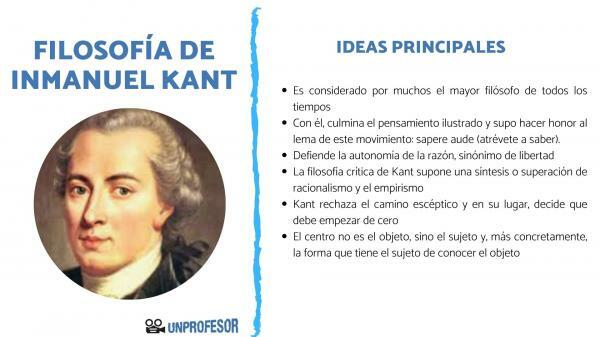The PHILOSOPHY of Immanuel KANT

In this lesson we will teach you the foundations of Immanuel Kant's philosophy, one of the most important philosophers in our history. Many analysts consider him the greatest author in history, and therefore a source of knowledge for the philosophical thought to the present day. If you want to know what are the key questions of philosophical thought in this video we are going to teach and you will know that these questions are the same ones that made the philosopher change and start from scratch Kant.
If you want to know what the Copernican revolution is in the field of knowledge and what are the strengths of the Kant philosophy, Don't miss this lesson!
Index
- Summary of Kant's philosophy
- The four key questions in Kant's philosophy
- Kant's Copernican Revolution
- Coming of age of humanity in Kant's philosophy
Summary of Kant's philosophy.
To know the philosophy of Immanuel Kant you should know that this thinker is considered by many to be the greatest philosopher of all time and a great influence on the history of philosophy to this day.
With him, the enlightened thinking and he knew, like no one else, to honor the motto of this movement: sapere aude (dare to know). Thus, Kant claimed that the Enlightenment supposed the departure of the human being from his minority, or what is the same, the autonomy of reason, synonymous with freedom.
He studied Newtonian physics and Rousseau philosophy Y Hume, one of the highest representatives of modern empiricism. Of the latter, the German affirms that he was the one who woke him up from his dogmatic dream, from the dream of reason, since, up to that moment, Kant had been a rationalist (Leibniz-Woff).
Kant's critical philosophy supposes a synthesis or overcoming of rationalism and empiricism, and with this he ends a debate that would have lasted for centuries. It is precisely at this stage that his fundamental works correspond: criticism of pure reason, criticism of practical reason, and criticism of judgment.
The four key questions in Kant's philosophy.
Unlike David Hume, Kant rejects the skeptical path and instead he decides that he should start from scratch. And here precisely lies one of the greatest achievements of the enlightened philosopher, in having been able to rethink the entire history of philosophical thought.
- What can I know? (From the theory of knowledge)
- What should I do? (From ethics)
- What can I expect? (From anthropology)
- What is the human being?
The first, which he develops in the Critique of Pure Reason, try to find the source, origin and limit of knowledge. The second, which responds in the Critique of Practical Reason, responds to rules of action. The third, analyzed in the Criticism of the trial, has to do with hope and the fourth, which is a summary of the other three, tries to find out the meaning of human existence.
“All the interests of my reason, speculative and practical, are combined in the following three questions: What can I know? What should I do? What can I expect? "
Kant's Copernican Revolution.
Kant raises the need for change the way of understanding philosophical thought, and especially, in the field of the theory of knowledge. Previous philosophy had only taken into account the way of knowing objects according to their way of being. The most important thing up to that point was the object. But for Kant, the center is not the object, but the subject and, more specifically, the way the subject has of knowing the object.
Valid knowledge does not have its center in the external reality that is not "given", but in what the subject "puts". This is the same thing that he did, at the time, Copernicus: he placed the Earth revolving around the sun, thus changing the center of philosophical and scientific interest.
The fundamental thing, from Kant on, will not be the objects themselves, but the way of knowing objects, what the subject puts in them at the time of meeting them.
“If we call sensitivity to the receptivity that our psyche possesses, whenever it is affected in some way, in order to receive representations, we will call understanding the ability to produce them by itself, that is, the spontaneity of the knowledge. Our nature implies that intuition can only be sensitive, that is, that it only contains the way in which we are affected by objects ”.
The coming of age of humanity in Kant's philosophy.
According to Kant, with illustration humanity has already come of age and, therefore, is able to direct its own destiny. This means that already does not need authoritarian political systems or paternalistic, but freedom must be the foundation of all political thought.
Enlightenment is the liberation of man from his guilty inability. Incapacity means the impossibility of using his intelligence without the guidance of another. This inability is guilty because its cause does not lie in lack of intelligence but in decision and courage to use it for himself without the tutelage of another. Sapere aude! Have the courage to use your own reason! This is the motto of the illustration ”.
The integral autonomy of reason is only achieved with boldness and criticism, based on reason, but from experience. Kant opens a political ethical project for the improvement of humanity based on two bases: the belief in the idea of progress and in the possibility of objective knowledge.
If you want to read more articles similar to The Philosophy of Immanuel Kant, we recommend that you enter our category of Philosophy.



